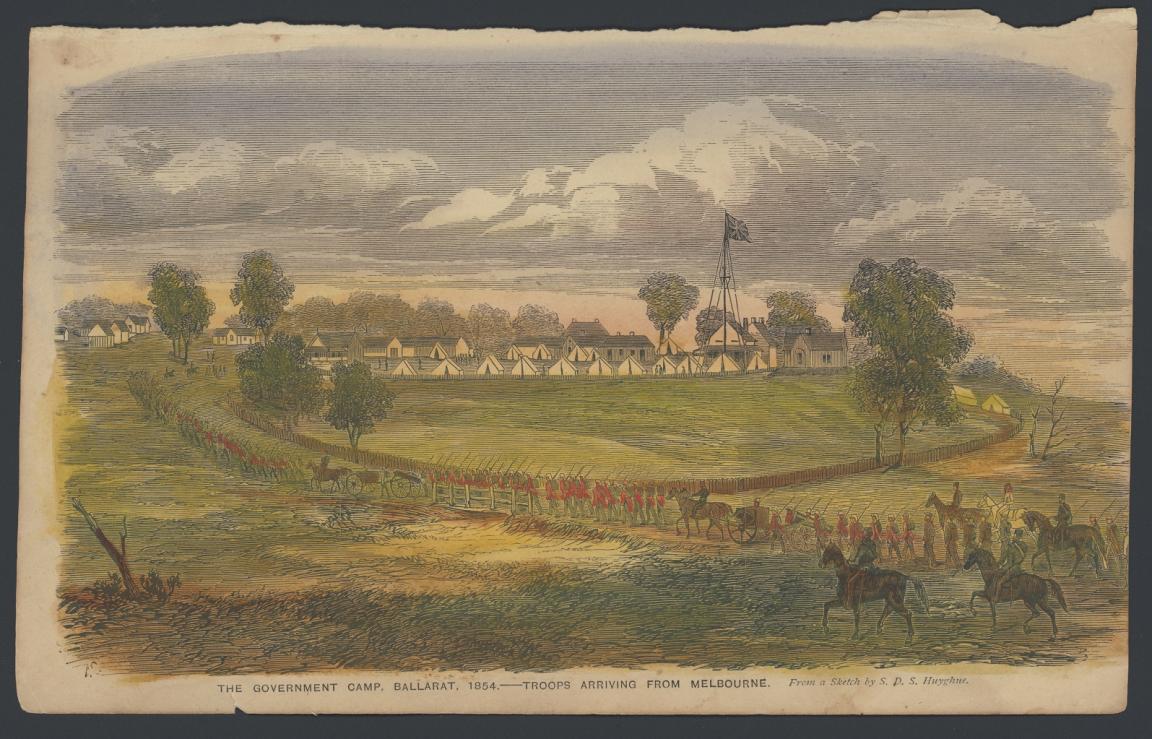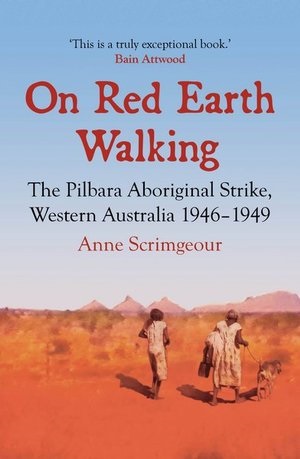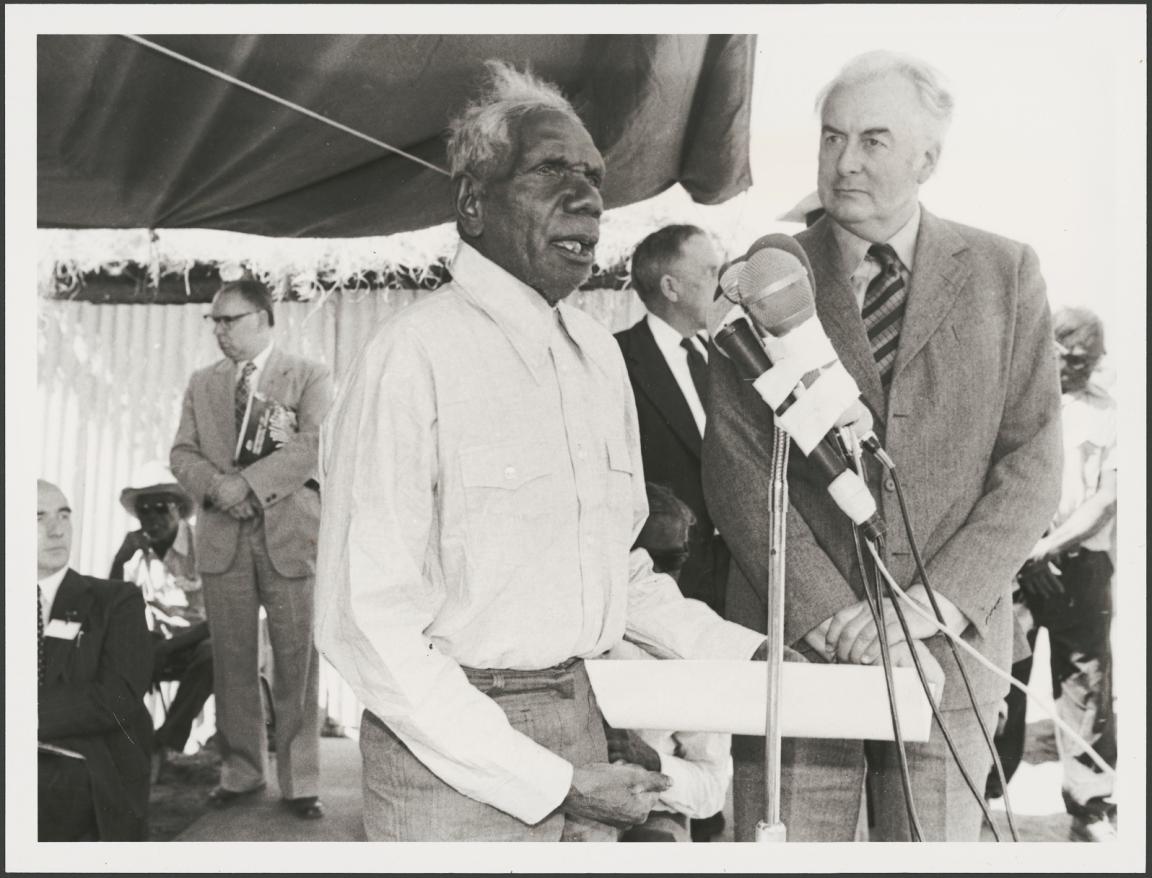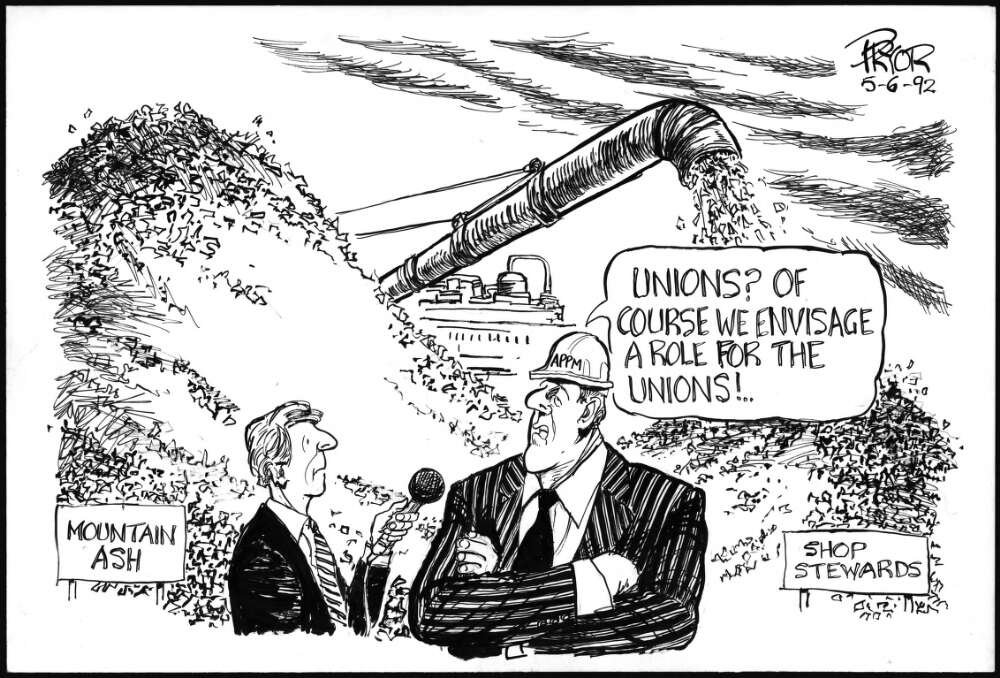Workers' rights movement
Just getting started?
For general sources and search tips to navigate our collections on protest, participation and dissent in Australia, go to our protest and dissent research guide.
Eureka Stockade
We hold some of the rarest materials for the Eureka Stockade in our collection.

A Clint & S.D.S Huyghue & William Bramwell Withers The Government Camp, Ballarat, 1854, troops arriving from Melbourne, 1870, nla.gov.au/nla.obj-135871465
A Clint & S.D.S Huyghue & William Bramwell Withers The Government Camp, Ballarat, 1854, troops arriving from Melbourne, 1870, nla.gov.au/nla.obj-135871465
Key sources
We hold rare items from the Eureka Stockade. Both the journal entries from the gold miners and the letters from Charles Pasley give an insight into what conditions were like at the time and provide details about the Eureka Stockade that cannot be found anywhere else. Items include:
- an original fragment of the Eureka Stockade flag
- eyewitness accounts from miners
- letters written by British Army officer Charles Pasley
Pictures
There is also a range of related material from our pictures collection. Through this material we can gain a visual into how things looked at the time and see the diversity of people involved in the Eureka Stockade.
There is also a range of related material from the pictures collection, with a colonial wood engraving of the Eureka encampments to the photographs from the set of ‘Eureka Stockade’ film from 1947.
Search tips
Use keywords to search by title, author or subject in the catalogue or Trove.
You can search by the subject 'Eureka Stockade' to find broad resources, or try these specific search terms:
- Peter Lalor 1854
- 1854 Ballarat
- Charles Pasley
- Gold miners 1854 Australia
Cummeragunja Walk Off
The Cummeragunja Walk Off was one of the first recorded strikes by First Australians on the Australian mainland, taking place in 1939 (the Torres Strait Maritime Strike occurred three years prior). While the National Library does not have a large amount of material for this protest, what is contained in the collection is quite unique.
Key sources
The Cummeragunja Walk Off was one of the first recorded strikes by First Australians on the Australian mainland, taking place in 1939 (the Torres Strait Maritime Strike occurred three years prior).
While we do not have a large amount of material for this protest, what is contained in the collection is quite unique.
One such item is a book containing newspaper clippings from the time of the strike, called ‘Exodus from Cummeragunja: news clippings 1938 to 1961’. It was researched and compiled by Bill and Lynne Lumley for the Bangerang Cultural Centre in Shepparton and provides an incredible insight into the motivation for the walk off and the events that occurred on Cummeragunja Station beforehand.
In addition to the unique item mentioned above, there is variety of resources available from our collection of books, digitised newspapers and gazettes, pictures, audio and eResources.
Search tips
Use keywords to search by title, author or subject in the catalogue or Trove.
Try these specific search terms:
- Cummeragunja
- Cummeragunja walk off 1939
- Cummeragunja Station
- Bill Onus
Alternative spellings
There are various spellings of Cummeragunja. We have listed the spelling that yields the most search results, but alternative spellings will achieve different results.
The Pilbara Stockmen’s Strike
In 1946, on May 1st, eight hundred First Australian stockmen and pastoral workers walked off stations across the Pilbara, making it one of the biggest strikes of the era. The Library’s digitised newspapers and gazettes are a rich source of knowledge on this topic, with numerous titles providing insights into opinions of the strike at the time. Titles of particular focus are those from Western Australia including ‘The West Australian’ and ‘The Workers Star’.

Anne Scrimgeour, On red earth walking:the Pilbara Aboriginal strike, Western Australia 1946 - 1949, 2020, nla.cat-vn8079092
Key sources
A unique item from the Library’s collection is an audio recording of Don McLeod interviewed by Mary Anne Jebb.
Don McLeod was a non-Indigenous man who assisted with the organisation of the strike, working with those of the Pilbara Strike at a time when there were laws and policies in Australia promoting segregation and preventing Aboriginal and Torres Strait Islander and non-Indigenous people from coming together. The interview details McLeod’s firsthand experiences as a participant of the strike, as well as information about the policies of the Western Australian Government at the time.
Search tips
The collection also includes a variety of documentary resources, particularly books and eResources. Find them by using keywords to search by title, author or subject in the catalogue or Trove.
Try these search terms:
- Pilbara Strike 1946
- Don McLeod
- Dooley Bin Bin
- Clancy McKenna
- Peter ‘Kangkushot’ Coppin
The Gurindji Strike/Wave Hill Walk Off
The 1966 Gurindji Strike is one of the most well-known protests in Australia, with the event gaining national attention. It inspired singer-songwriter Kevin ‘Kev’ Carmody to write the popular Australian anthem, ‘From Little Things, Big Things Grow’.

Penny Tweedie & Australian Information Service, Elder Vincent Lingiari of the Gurindji Language group, addressing the media after Prime Minister Gough Whitlam officially returns Aboriginal land at Wattie Creek, Northern Territory, 16 August 1975, nla.gov.au/nla.obj-138156433
Penny Tweedie & Australian Information Service, Elder Vincent Lingiari of the Gurindji Language group, addressing the media after Prime Minister Gough Whitlam officially returns Aboriginal land at Wattie Creek, Northern Territory, 16 August 1975, nla.gov.au/nla.obj-138156433
Key sources
We hold a large variety of different materials that relate to the Gurindji Strike. This material provides excellent details about what occurred leading up to the Gurindji Strike and what took place after the walk off.
Some of the most notable include:
- an audio recording of Vincent Lingiari interviewed by Frank J. Hardy
- audio captured from Wave Hill Station, photographs from the returning of Aboriginal Land at Wattie Creek in 1975
- digitised newspaper articles from 1966
These books might also be useful:
- Unlucky Australians
- Hidden histories : black stories from Victoria River Downs, Humbert River and Wave Hill Stations
Search tips
The collection also includes a variety of books, digitised magazines and journals, manuscripts, archived websites and eResources. Find them by using keywords to search by title, author or subject in the catalogue or Trove.
Try these search terms:
- Gurindji Strike
- Vincent Lingiari
- Gurindji walk off wave hill station
- Wave Hill Station
Formation of trade unions
Trade unionism holds an important place in Australian history. We hold a significant amount of print material to draw from.
Key sources

Geoff Pryor "Unions? Of course we envisage a role for the unions! - "[APPM executive talking to a reporter], 1992, nla.gov.au/nla.obj-156743186
- Trade Unionism ephemera collection: materials that documented everyday life (such as pamphlet, booklets and advertising material, etc.).
- Specific union resources: for example the monthly journals from the Amalgamated Metal Workers' Union.
Search tips
The Library’s collection of digitised newspapers and gazettes are another great resource, which provides an insight into the opinions of the time in relation to the union strikes. There is also a wide variety of resources available from our collection of books, pictures, audio and eResources.
Find them by using keywords to search by title, author or subject in the catalogue or Trove.
- Geoff Pryor trade unionists
- Unions Australia
- History of unionism in Australia
- Trade Union Strikes
- Trade unionism
Get help with your research
Our specialist staff can help you with your research, to locate resources and to use our microform and scanning equipment, but they cannot undertake extensive or ongoing genealogical, historical or other research on your behalf.
Find out more in our Information and Research Policy.
Where else to look
You can find more resources and information to support your research from other institutions and organisations.
- Learn more about the evolution of working conditions in Australia via the National Museum of Australia’s Defining Moments.
- Visit the Australian Council of Trade Unions timeline of union movements.
- Find out more about First Australian protests by visiting AIATSIS’s Mura collection and AIATSIS's photographic collections.